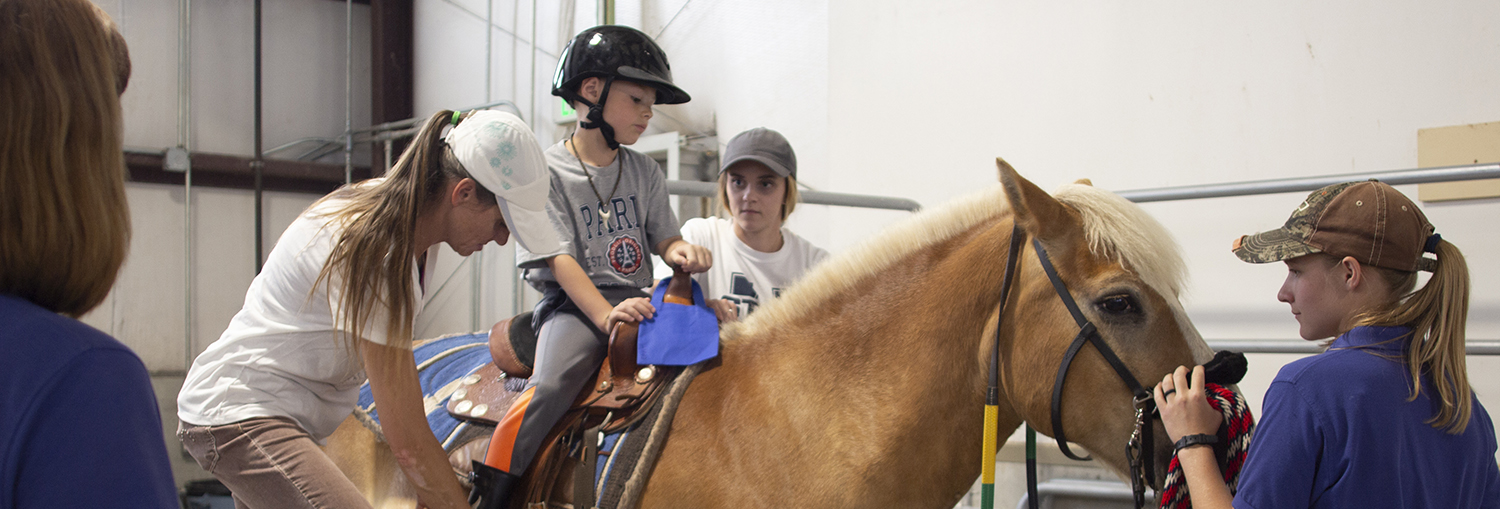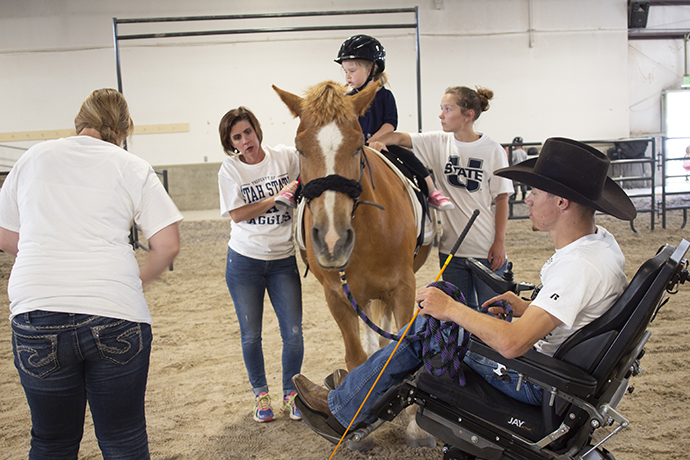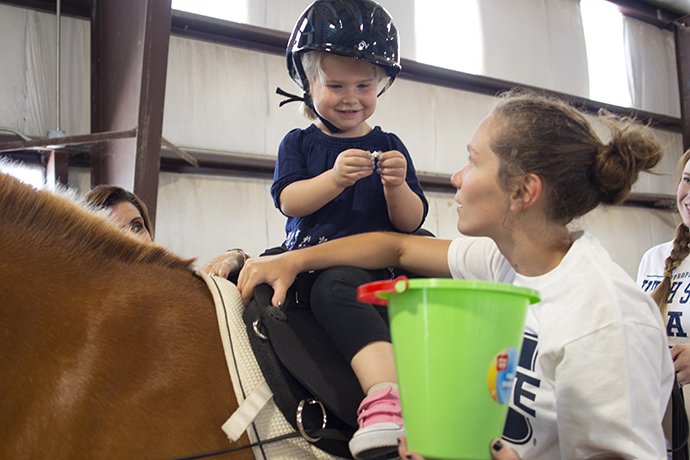Discovering New Possibilities in the Saddle
by Bronson Teichert and Lynnette Harris


You may know a child or adult who benefits from therapy for shyness, anxiety, autism, learning delays, or physical challenges. The College of Agriculture and Applied Sciences’ equine therapy programs are moving some therapy sessions from the doctor’s office to the horse barn, helping clients now while also preparing USU students to build careers that blend their love of horses with helping and healing people.
Judy Smith, assistant professor of equine assisted activities and therapy (EAAT) said “Horses have innate qualities that make them unique therapeutic partners and we use these characteristics to benefit people who face special challenges in life.”
Both the therapies and activities facets of the program require a balance of understanding horses and people.
“Equine therapies serve a wide variety of people, and it’s not enough to just be a really good horseman,” Smith said. “We prepare students to become equine specialists who will work with licensed mental health professionals to address clients’ mental and behavioral issues. In the case of hippotherapy, specialists work with a physical therapist or speech therapist to focus on the movement of the horse and the therapeutic results of riding.”
The minor in EAAT appeals to students exploring many majors and careers in psychology, counseling, social work, physical therapy, and occupational therapy. The activities segments of the program help teachers enhance their students’ learning experiences with horses, such as in the Reading Corral program that takes horses to schools and libraries. Smith said Reading Corral is the beginning of what will become a larger literacy project; a larger project with smaller horses. Two miniature horses are being trained and will join the Reading Corral program once they are certified as therapy animals.
“Studies show that the presence of animals can be calming and they reduce people’s stress level, and help develop focus,” Smith explained. “Our miniatures can go into places that our bigger therapy horses cannot. Also, because of their smaller size, they are not as intimidating to small children.”
The Reading Corral was a highlight of the North Logan Library’s 2018 summer reading program as Sherrie Petty in USU’s EAAT program worked with children sharing books and activities that included therapy horses. She pointed out that research shows including an animal in this sort of activity lowers people’s cortisol levels, reduces the heart rate, and puts them in a state that prepares them to learn.
Another program, Ride-Ability, brings children to USU’s equine facilities at the Animal Science Farm in Wellsville.
“Ride-Ability is an adaptive riding program that focuses not on limitations, but rather on what’s possible,” Smith said. “We encourage our riders to explore what they believe they are capable of and challenge them to go beyond.”
Smith, and other USU equine therapy experts and volunteers, focus on building each rider’s independence and confidence. Happily, those improvements often begin to happen in the first lesson. Many children in the program need to work on focus and may, for example, be given an assignment to guide a horse to different buckets containing colored objects and retrieve some of them. Each assignment must be completed in steps in a specific sequence and participants must communicate to instructors about the steps they are completing.
Parents like Jennifer Simon, who brings her 4-year-old daughter Brooklyn for therapy sessions with the horses, loves seeing her daughter smile while riding around the arena.

“I love it,” Simon said. “It is very inclusive. They’re working on speech and they’re working on colors and on sounds for different things they’re pulling out of the buckets and they’re teaching her how to communicate with the horse.”
Brooklyn has seizures, but Simon said after a month of equine therapy, her motor skills and speech were improving.
“It’s such a calming influence on her brain and will hopefully help her go longer between seizures,” Simon said. “I can’t thank the teachers enough. They’re welcoming, they’re positive, they adore my daughter, and she feels that love.”
Reagan Woodward is a USU senior Equine Assisted Therapies student who volunteers during therapy sessions. She has worked with children who have disabilities since she was in junior high school and has always loved horses, so seeing riders grow physically, mentally, and emotionally is especially rewarding.
“It’s one of the best feelings in the world, especially if they come in with a little bit of a fear of the horses and then you see them overcome that fear and be able to love and pet their horses at the end,” Woodward said. “I love seeing them grow in that way.”
For more information, watch this video of Ride-Ability

